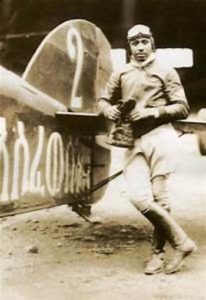
John C. Robinson
*John Robinson was born on this date in 1905. He was a Black aviator and activist.
John Charles Robinson was born in Carrabelle, Florida, and spent his early years in Gulfport, Mississippi. His father died when he was a baby, leaving him and his four-year-old sister, Bertha, with their mother, Celeste Robinson, who married Charles Cobb. Robinson was inspired by flight at an early age. According to one account, in 1910, Robinson was seven years old when he witnessed a float-equipped biplane flown in Gulfport, Mississippi.
Robinson completed his education at Gulfport High School for the Colored in 1919, where he developed a strong interest in mechanics and machinery. However, Robinson could not continue his education in Gulfport; Blacks were barred from continuing their education beyond the tenth grade. He made preparations to attend the Tuskegee Institute in September 1921. He studied automotive mechanical science, graduating three years later. In addition to studying automobiles, he learned math, literature, composition, and history.
He repeatedly applied to the Curtiss-Wright School of Aviation in Chicago but was denied each time. He got a job there as a janitor and unofficially sat in on classes until an instructor managed to secure a place for him, and he was the first Black student at the school. Robinson pushed for equal opportunities for Blacks during his early career, opened his eponymous aviation school, and initiated a program for Black pilots at Tuskegee Institute. Robinson's achievements as an aviator were in stark contrast to the limited opportunities for most Blacks in aviation careers. They were an important factor in reducing racially based prohibitions in the United States.
He was hailed as the "Brown Condor" for his service in the Imperial Ethiopian Air Force against Fascist Italy. Robinson is sometimes called the "Father of the Tuskegee Airmen" for inspiring this all-black group of pilots who served in the United States Army Air Forces following the United States' entry into World War II. In 1944, after Ethiopia's liberation by the Allies, Robinson returned to the country to establish a pilot training school. He also played a role in the foundation of Ethiopian Airlines. John Robinson died in Addis Ababa on March 27, 1954, from injuries he suffered in a plane crash.